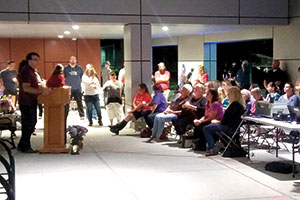
The Somerville Overcoming Addiction Fourth Annual Vigil took place at the East Somerville Community School last Saturday evening.
By Rob Carter
Firefighter Thomas Ross stood next to a large silver bell outside of the East Somerville Community School Saturday night. As community members stood at a podium nearby and read off a list of names, Ross punctuated each one with a toll of the bell.
The names were those of community members who have died because of opioid abuse. Ross rang the bell 259 times.
“We need to talk about what’s happening in our state,” Joann Bocca-Rivieccio a moderator at the Somerville Overcoming Addiction Fourth Annual Vigil said.
Over 1,700 people died in Massachusetts due to drug overdoses in 2015 the most recent year for which the Center for Disease Control has data available. Organizers said they started the vigil four years ago to celebrate the lives of those 1,700 people.
Before the reading of the names, Somerville Overcoming Addiction invited two mothers whose children died after opioid overdoses to share their story.
“Steve’s addiction started – as many of your loved ones’ probably did – with a doctor,” Debbie Deagle, one of the mothers began.
Deagle’s son became addicted to opioids after he was prescribed painkillers following surgery for impacted wisdom teeth.
Before his addiction, Deagle said he was a bright and happy kid. After she said he would often call her in tears saying “Mom, I just want to be normal again.”
Deagle said her son went through multiple detox treatments, but never managed to remain sober. He died after an overdose on Jan. 8, 2015.
“I feel like I died the day my son died,” Deagle said. “We need help from the legislature. We need more than just talking.”
Jeanmarie McCauley, who took the podium with her daughter, has three sons who died after overdoses.
“Like any mother, I tried to save my boys,” McCauley said.
But after taking one of her sons to somewhere between 25 and 50 detox centers, she still wasn’t seeing results.
“5 to 7 days is not enough time to get better,” McCauley said.
In a last-ditch effort, she sent him to a rehabilitation clinic in Florida, but he was never able to recover from his addiction. Hoping to be able to at least keep him alive, McCauley began carrying Narcan, a drug which can be used to treat a narcotic overdose.
“I carried Narcan on me all the time,” McCauley said. “I carried it in my car. I carried it in my purse.”
And McCauley used it to revive her sons multiple times. Eventually though, each overdosed in a situation where she couldn’t be there to rescue them.
By the end of the process, she said “I had no money to bury any of my children.”
McCauley was only able to afford services for her children thanks to support from the community, she said.
Addressing the crowd, many of whom had loved ones die because of substance abuse disorders or struggled with addiction themselves, McCauley urged them to help destigmatize addiction.
“It’s OK to let people know you’re sober,” McCauley said. “It’s not an embarrassment. It’s a miracle.”












Too many lives lost. Too many families and friends that suffer from the loss of a loved one.
In addition to educating kids in school, the treatment of those who have this problem, the treatments presently in place need to be seriously checked out.
Treatment for two weeks, a month, are a waste of time and a financial ripoff. Addiction, depending on type, length of time, etc. that the individual has, need for many more months of real treatment.
One time in my life I worked at a health facility that, in addition to the main facility, had various satellite buildings on the campus that were used for alcohol treatment, drug abuse, etc. that were operated by private vendors. Every two weeks or so, Hierarchy from the private vendors would drive up to one of the buildings used by their business to look at the books and then drive off. After two weeks clients would leave and usually after a couple of months, a large amount of those same clients were back again.
Former Governor Weld, in his rush to make state land available to developers, closed nine state hospitals. Not just Mental Health hospitals, he also closed Public Health hospitals too. Thus, adding to the
homeless population and denying treatment to those in need.
Privatization of services places profit before treatment. The serious addiction problems today stress the need for state operated long term
care facilities to provide true care for these human beings.
Mandated treatment, if said person continually walks away, then after a few chances, that’s it… No more treatment. That bed will then be given to a person who truly wants to be cured.